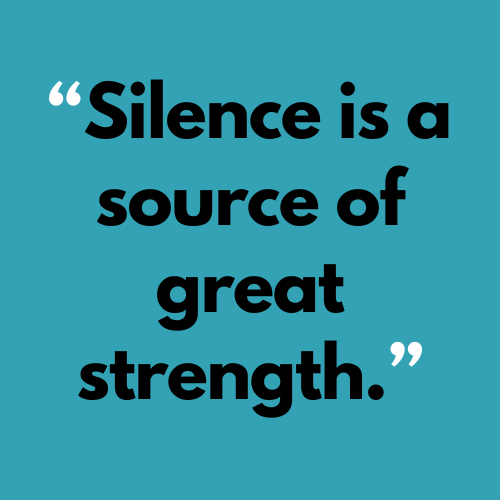Do you remember a time when you regretted something you said? I definitely do. I remember multiple times I regretted certain things I said. I wish I was just silent cause there are certain things that you can never take back. In this blog we’re going to be talking about why silence is a critical skill to learn to become the most resilient version of yourself.
I used to think that the person who always had something to say was smart. I would be impressed by someone who always had knowledge of random topics or an opinion on everything. And so I would strive to do that. I strove to always have something to say in the conversation. I thought if I said more things, then people would think I’m smart and they’d like me more. And so I felt like there was all this pressure to always have something to add to every conversation. This pressure made hangouts for me not as fun. I felt like I couldn’t just be chill during gatherings.
Back in the day, I used to struggle with making friends and getting people to like me. I tried being the funny one in most situations. Making people laugh used to always work for me. At the end of conversations, people would be like ‘Wow you’re so much fun’.
What I didn’t realize that this would come hurt me in the future.
Talking too much is actually the opposite of being smart and wise. Think about it, have you ever met someone who talked less and you just wondered what they were thinking? Being silent creates this mystery about you that is extremely appealing.
I used to think that people who didn’t talk a lot, are not fun to be around. But time and time, I found myself wanting to be around those people even more. The people who didn’t talk so much. The people who could exist in silence. The people who spoke when they had something useful to say. The ones who stayed away from extra and unnecessary conversation.
Acquiring the skill of silence will honestly change your life. I am just now working on it deliberately and it’s one of my goals for 2024. I want to be a lot more wise and smart in the way I converse with others. When I started to learn about all the benefits of just this one skill, my brain was blown. I want to share just 10 of the benefits I found.
Number 1: It makes you more conscious. When you’re silent, you’re more aware of your thoughts. Imagine if in every conversation you had to say your response in half the amount of words you usually respond in. So let’s say someone says, “How was your day” and you usually respond by giving 5 sentences of how your day was. You have to now give your response in 2.5 sentences. This makes you more conscious and aware of what you’re saying. You’re more careful with the words you choose. Also short breaks of quiet time can actually help grow new cells in a part of the brain called the hippocampus, which is a big deal for learning and memory. So, by embracing silence, we’re giving our brains a chance to refresh and become more aware of our thoughts and surroundings.
Number 2: It makes you a better listener. When you don’t have the stress of always having a response then you can just listen to the people around you. Everyone just wants to be heard. Many times people don’t even want advice. They just want someone to listen to them and make them feel heard and understood. When you say less, people feel more comfortable opening up to you.
Number 3: It reduces arguments and regret. How do arguments happen? It’s when 2 or more people are talking. You can’t have a real argument if it’s just one person talking and the other person staying silent, correct? It takes 2 to tango. And so by staying silent you’re actually creating less room for arguments. You’re also diffusing an argument that is about to or is taking place. If you and your spouse for example are having a discussion that is about to turn into an argument and you stop responding, then the argument will end. Now there is a correct way to do this. This doesn’t mean you give the silent treatment. That means you say, ‘please go ahead and explain your part, I’m listening.’ And then once they’re done you can choose to respond or say I don’t have a response right now and I’d like to talk about this later. This way the heated argument easily dies down. If you respond in that moment, it’s so easy to say the wrong things and have so much regret. When have you ever regretted staying silent? Probably a handful of times. It’s really rare to regret not saying something. But it is extremely common to regret saying the wrong thing.
Number 4: It makes you more mysterious. When someone talks a lot, you feel like you know everything about them. There’s no mystery about what they’re thinking or who they are. It’s also easier for the brain to make a judgement call on the person. Your brain will be able to tell you quickly whether you like this person or not. But if they stay silent and only speak a little bit, your brain needs more data to understand whether this person is a friend or not.
Number 5: It makes you appear more wise and smart. Think about any smart and wise person you look up to. Do they talk a lot? Are they really loud? Or are they calm, collected and only say a few words. What actually shows a person’s level of intelligence, is how concise they can be in their speech. My mom was probably the most wise person that I met personally. She was actually known for her silence and continuous genuine smile. When my mom passed, not a single person had something bad to say about her. In fact, even when she was alive, no one had anything bad to say about her. Everyone liked her. Literally everyone. It’s because she was always careful in what she said. She preferred to be the silent one in gatherings. She’d do her adhkar continuously cause she always believed that will get her further in life than pointless conversions. And also someone who talks a lot has a lot more chances of saying the wrong thing which will easily tarnish their appearance of being wise or smart.
Number 6: People will like you more. Ever met someone who always has an opinion about everything? Do you like those people? Probably not. When someone always has something to say and can never just listen and agree, it can get annoying. We all want to be around people who are easy to be around. People who listen and talk only when they have something beneficial to say.
Number 7: It gives you more confidence. There is so much power in not responding to everyone. There is so much power in loving yourself so much that you don’t need someone else’s validation. Many times, people want to say something and have a response because they’re looking for the other person’s approval. They’re seeking validation in some way. Imagine if you just didn’t need someone’s validation. Imagine if you didn’t need to say things just to please someone else. A lot of people pleasing comes from saying what others want to hear. It’s not holding true to your values because you want others to approve of you.
Number 8: It protects you from gossip and pointless conversations. I’ve noticed that when you talk to someone with no real purpose in mind, the conversation quickly becomes pointless. And it sometimes ends up being converations about other people. This is a lot more prevalent in women than men. Women for some reason love to talk about others. Of course this is not all women. I just remember that my mom used to stay silent in gatherings because she would say usually those conversations would turn into gossip about people. Honestly gossip is a massive problem in society and the only way to have gossip is by breaking your silence. You can’t have gossip if everyone is either silent or carefully choosing their words.
Number 9: It makes your Islam better. Narrated Abu Musa: Some people asked Allah’s Messenger (ﷺ), “Whose Islam is the best? i.e. (Who is a very good Muslim)?” He replied, “One who avoids harming the Muslims with his tongue and hands.” The more silent you are the less chances you have of hurting someone with your tongue.
Number 10: You are following the Qur’an and Sunnah
هَـٰٓأَنتُمْ هَـٰٓؤُلَآءِ حَـٰجَجْتُمْ فِيمَا لَكُم بِهِۦ عِلْمٌۭ فَلِمَ تُحَآجُّونَ فِيمَا لَيْسَ لَكُم بِهِۦ عِلْمٌۭ ۚ وَٱللَّهُ يَعْلَمُ وَأَنتُمْ لَا تَعْلَمُونَ (٦٦)
Here you are! You disputed about what you have ˹little˺ knowledge of,1 but why do you now argue about what you have no knowledge of?2 Allah knows and you do not know.
In the Qur’an we are instructed to not argue about things that we don’t have knowledge of. There will be many times that you will be in a conversation where you truly do not have any knowledge of the topic but because you want to fit in, you will make something up and talk. It’s better to stay silent even if it makes you seem less intellectual.
The Prophet (ﷺ) said, “He who believes in Allah and the Last Day must either speak good or remain silent.”
From this hadith we can see that we are encouraged to speak when what we have to say is good. If it is not good then it’s better to remain silent. This is where the wisdom of the Prophet SAW comes in. You cannot always stay silent. You can’t just go mute. If you just go mute from now on then none of those benefits apply to you. You can’t say nothing for the rest of your life. It’s about knowing when to talk, what to say, how much to say and when to stay silent.
And whenever you are confused and in doubt, stay silent. Remember the phrase: ‘When in doubt, stay silent.’
A wise person knows when to stay silent and when not to stay silent.
For example, if a topic comes up that you actually have really good knowledge on, talk about it. Control how much passion you bring to the table but also don’t stay silent.
No one wants to be friends with someone who doesn’t say anything, right? Learning the balance of when to speak and when to stay silent is a critical skill to learn.
It takes time to learn. And the easiest way I have found to start implementing it in my daily life is to start speaking less than I normally do. I believe that is the first step. Once you can do that, then you have to start observing the words you do say when you speak. And also start observing the intention behind why you’re speaking. Are you speaking because it’s necessary or speaking because you want other people’s approval? Once you become conscious of your words, you’ll also become conscious of the types of conversations you’re putting yourself in. Another tip would be to be okay with awkward silences. It is okay to be in someone’s presence and no one is speaking. Sometimes it’s much nicer than talking about random things just to fill the awkwardness.
Just remember, this skill will take time to learn but it’s very possible. And once you acquire this skill, trust me, life will be so much better. Insha Allah let’s make this one of our goals for 2024 together.
Until next time my friend,
Remember you got this because you have Allah.
Your sister,
Mariam

